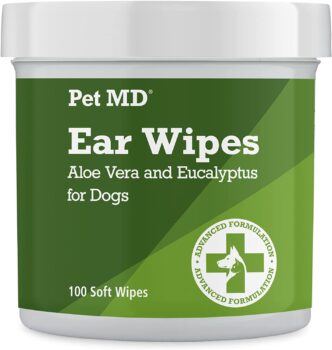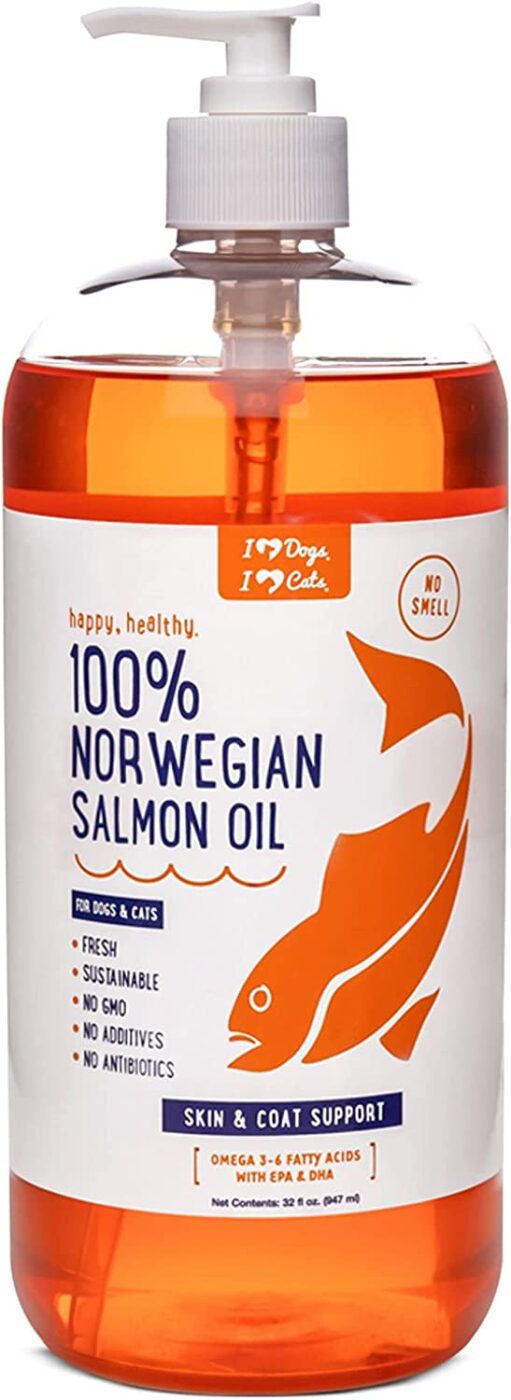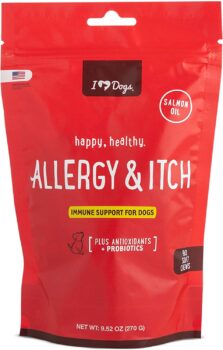Lhasa Apsos are adorable dogs known for their charm and loyalty. As delightful as these pets are, they can be prone to ear infections. This article offers 11 strategies for treating and preventing ear infections in Lhasa Apsos, and discusses the importance of Omega-3 in their diet.

iHeartDogs is reader supported. Some of the links below may be paid affiliate links, where we receive a small commission on a product at no additional cost to you.
1. Regular Ear Cleaning and Checks
Examining your Lhasa Apso’s ears regularly for signs of infection, such as redness, swelling, or unusual smell, is crucial. Use a vet-recommended cleaner and avoid over-cleaning to prevent irritation.
Our favorite ear cleaner is these PetMD brand ear wipes on Amazon.
2. Dry Ears After Swimming or Bathing
Water in the ear canal can promote the growth of bacteria, causing infections. Therefore, always dry your Lhasa Apso’s ears thoroughly after exposure to water.
3. Incorporate Omega-3 Fatty Acids into Their Diet
Omega-3 fatty acids can help manage inflammation due to allergies, often a root cause of ear infections. Incorporate Omega-3-rich foods like fish and flaxseeds or supplements into your Lhasa Apso diet.
We’re fans of this Norwegian salmon oil on Amazon. It’s a bright orangish-pink color and has no fishy smell at all due to it’s ultra high purity.
4. Regular Veterinary Check-ups
Routine vet visits allow for early detection and treatment of potential ear infections, preventing them from developing into more serious conditions.
5. Identify and Eliminate Allergens
If your Lhasa Apso has allergies, these can lead to ear infections. Identify any allergens your dog may react to and try to eliminate them from their environment and diet.
A few good supplements to help your dog’s allergies are apple cider vinegar, quercetin, and colostrum, all of which are found in many natural allergy supplements like this one.
6. Keep Up-to-date with Vaccinations and Parasite Control
Ensuring that your Lhasa Apso is current with vaccinations and regular parasite control can help boost their immune system and reduce the risk of ear infections.
7. Use Vet-prescribed Medication for Existing Infections
If your Lhasa Apso has an ear infection, your vet may prescribe antibiotics or antifungal medications. Follow the prescribed dosage and duration to ensure effective treatment.
8. Consider Surgical Intervention for Chronic Cases
In chronic or severe ear infection cases, your vet might recommend surgical intervention to improve drainage and aeration of the ear canal.
9. Supplement Your Lhasa Apso Diet with Probiotics
Probiotics can help maintain a healthy gut microbiome, which may enhance the immune system and lower the risk of ear infections.
10. Use an E-Collar During Treatment
An e-collar can prevent your Lhasa Apso from scratching and causing further damage to their ears during infection treatment.
11. Maintain a Clean Living Environment
A clean living environment can help prevent various health issues, including ear infections.
FAQs on Ear Infections in Lhasa Apsos
1. Q: What are the signs of an ear infection in Lhasa Apsos?
A: Signs include frequent scratching, head shaking, redness, swelling, abnormal ear discharge, and a foul smell from the ears.
2. Q: Are Lhasa Apsos more prone to ear infections?
A: Lhasa Apsos are not necessarily more prone to ear infections than other breeds. However, factors such as allergies or a weakened immune system can increase susceptibility.
3. Q: How often should I clean my Lhasa Apso’s ears?
A: A healthy Lhasa Apso’s ears should be cleaned once a week. If your dog is prone to ear infections, you may need to clean their ears more frequently.
4. Q: Can Omega-3 in their diet prevent ear infections?
A: Omega-3 fatty acids can help manage inflammation due to allergies, potentially reducing the risk of ear infections.
5. Q: Can ear infections cause permanent damage in Lhasa Apsos?
A: Yes, untreated ear infections can lead to complications, including hearing loss. Prompt treatment is essential.
6. Q: Can I use human ear infection medicine on my Lhasa Apso?
A: No. Always use medication as prescribed by your vet. Human medications may not be safe or effective for dogs.
7. Q: What are common allergens for Lhasa Apsos?
A: Common allergens include certain food ingredients, dust mites, pollen, and specific cleaning products.
8. Q: How can I incorporate Omega-3 into my Lhasa Apso’s diet?
A: Omega-3 can be added to your dog’s diet through Omega-3-rich foods like fish and flaxseeds, or via supplements.
9. Q: Can I prevent all ear infections in my Lhasa Apso?
A: It’s challenging to prevent all ear infections, but the strategies mentioned above can significantly reduce the risk.
10. Q: What should I do if my Lhasa Apso’s ear infections keep recurring?
A: Recurrent ear infections may suggest an underlying issue like allergies or anatomical abnormalities. Consult your vet for a comprehensive evaluation and treatment plan.
In summary, the prevention and early detection of ear infections are vital for maintaining your Lhasa Apso’s overall health. With these strategies in place, you can ensure a healthy and happy life for your four-legged friend.



 Toledo, United States.
Toledo, United States.
